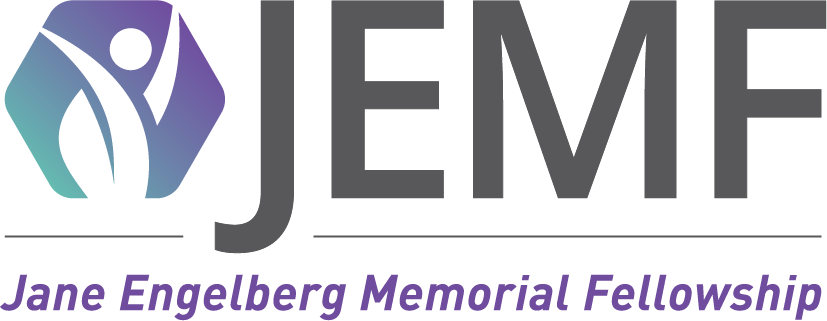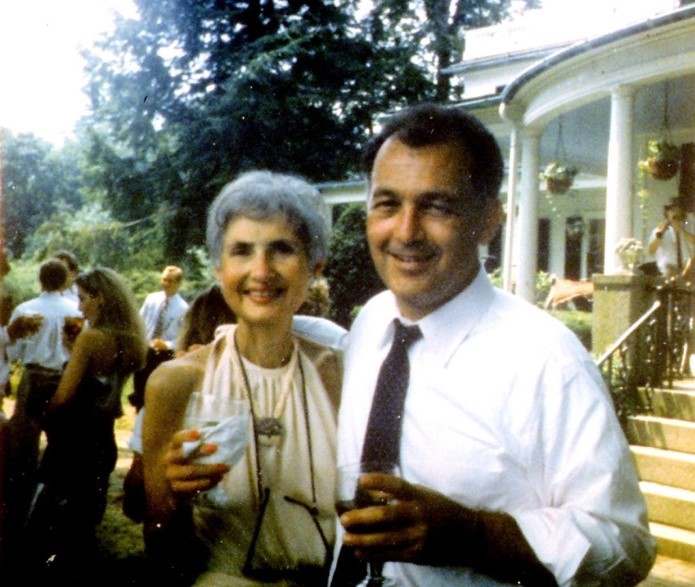 The Jane Engelberg Memorial Fellowship (JEMF), established in 1991 as a highly prestigious award of the National Society of Genetic Counselors, is an ongoing tribute to Jane Engelberg, who graduated from Sarah Lawrence College in 1973 with a master's degree in human genetics. During her 15-year career as a genetic counselor, Jane developed expertise in counseling patients on issues related to hemophilia and prenatal diagnosis. In response to the special needs of Spanish-speaking clients, Jane became a bilingual genetic counselor. The human qualities of insight, compassion, and dedication will always be associated with Jane. She worked tirelessly until her death in 1988 from complications of Hodgkin's disease.
The Jane Engelberg Memorial Fellowship (JEMF), established in 1991 as a highly prestigious award of the National Society of Genetic Counselors, is an ongoing tribute to Jane Engelberg, who graduated from Sarah Lawrence College in 1973 with a master's degree in human genetics. During her 15-year career as a genetic counselor, Jane developed expertise in counseling patients on issues related to hemophilia and prenatal diagnosis. In response to the special needs of Spanish-speaking clients, Jane became a bilingual genetic counselor. The human qualities of insight, compassion, and dedication will always be associated with Jane. She worked tirelessly until her death in 1988 from complications of Hodgkin's disease.

The JEMF is funded by the Engelberg Foundation, established by Jane's husband, Alfred B. Engelberg. The Engelberg Foundation is a charitable trust that supports a wide range of activities in the fields of healthcare, science, and education. On the 25th anniversary, the Engelberg Foundation gave a $1.5 million gift to permanently endow the award and ensure the ongoing support of genetic counseling research.
Objectives
The objectives of the JEMF are to advance the profession of genetic counseling by providing support for research and promoting the professional development of awardees. This is essential as the profession responds to changes in genetics, health care, policy and the ethical, legal and social dimensions of genomic medicine.
The JEMF aims to fund research projects that:
- Develop innovative approaches and/or service delivery models for genetic counseling practice;
- Improve access to genetic counseling among underserved populations
- Address an unmet need of a specific client population or populations
- Promote growth and competence in students and practicing genetic counselors
- Build a more diverse and inclusive workforce
Mission
The Jane Engelberg Memorial Fellowship (JEMF) provides support for research by genetic counselors, promotes individual professional development, and drives innovation in the profession of genetic counseling.
Individual Awards Information
Full Member Award
Student Research Award
Frequently Asked Questions
What is the mission of the JEMF?
The mission of the Jane Engelberg Memorial Fellowship (JEMF) is to provide support for scholarly endeavors, enable individual professional development, and drive innovation in the profession of genetic counseling.
What are the research priorities of the JEMF?
The JEMF prioritizes research that:
- develops innovative approaches and/or service delivery models for genetic counseling practice,
- improves access to genetic information and services, especially among underserved populations,
- promotes growth and competence in students, genetic counselors, and the genetic counseling profession,
- builds a more diverse and inclusive workforce, and/or
- addresses an unmet need of a specific client population or populations.
What awards does the JEMF offer?
The JEMF offers two different awards. Both awards are grants intended to support research amongst students and full members. Specific FAQs related to each award may be found by navigating to that specific awards webpage.
Can the JEMF Advisory Group (AG) help me determine if my idea is in scope with JEMF priorities?
The JEMF AG has a policy not comment upon the appropriateness of specific ideas prior to submission to ensure we can review all applications fairly. Our stated research priorities can be found above. We can, however, help you identify an application advisor well suited for your project. This is a person who either recently served on the JEMF Advisory Group and/or held a JEMF award in the past and is familiar with our review criteria and funding priorities.
How do I apply to be on the JEMF Advisory Group (AG)?
The JEMF AG is included in the NSGC’s Call for Volunteers that occurs in early Fall. Candidates must be board-certified in genetic counseling and members of NSGC in good standing. Interested ABGC-certified individuals submit a CV and completed application.
Current Advisory Group Members
- Cindy James, PhD, CGC, Chair (2022-2026)
- Emily Edelman, MS, CGC, Chair-Elect (2024 - 2028)
- Carrie Atzinger, MS, CGC (2022-2026)
- Courtney Berrios, MS, CGC, Information Officer (2025-2029)
- Karlla Brigatti, MS, CGC, Secretary (2024 - 2028)
- Colleen Caleshu, MS, LCGC (2023-2027)
- Erin Carmany, MS, CGC, Finance Officer (2025-2029)
- Martha Dudek, MS, CGC (2025-2029)
- Samantha Greenberg, MS, MPH, CGC (2026 - 2030)
- Julia Wynn, MS, MS, CGC (2026 - 2030)
- Heather Zierhut, PhD, MS, CGC (2026 - 2030)
Past Advisory Group Members
- Audrey Heimler, MS, Founding Board, Chair 1991-1999, Executive Chair, 2000-2002
- Ed Kloza, MS (1991-1993)
- Karen Greendale, MA (1991-1994)
- Judith Benkendorf, MS (1991-1995)
- Barbara Bowles Biesecker, MS (1991-1996)
- Barbara Bernhardt, MS (1993-1997)
- Joseph McInerney, MS (1994-1998)
- Bonnie Jeanne Baty, MS (1995-1999)
- Katherine A. Schneider, MPH (1996-2000)
- Robin L. Bennett (1997-2002)
- Joan Scott (1998-2000)
- Ann C.M. Smith, MA, DSc (hon) (1999-2004)
- Melissa Lenihan, MS (2003 - 2004)
- Andrew W. Faucett, MS (2000-2005)
- Wendy Uhlmann, MS (2001-2006)
- Emily Burkett, MS (2005-2006)
- Elizabeth Gettig, MS (2001-2007)
- Kathy Valverde, MS (2002-2008)
- Steve Keiles (2007-2008)
- Michelle Fox, MS (2003-2009)
- Toni Pollin, PhD (2005-2009)
- Jill Stopfer, MS (2006-2011)
- Caroline Lieber, MS (2009 - 2011)
- Christina Palmer, PhD (2007-2012)
- Kevin Sweet, MS (2008-2013)
- Laura Conway, PhD, MS(2009-2014)
- Jehannine Austin, PhD (2009-2014)
- Kelly Ormond, MS(2010-2015)
- Don Hadley, MS (2010-2014)
- Amy Cronister (2012-2014)
- Leslie Evans, MS CGC (2011-2016)
- Maureen Smith, MS CGC (2011-2016)
- Daniel Riconda (2015-2016)
- Melanie Myers, PhD MS LGC (2012-2017)
- Dawn Allain (2014 - 2018)
- Lauren Morgenroth, MS CGC (2014-2019)
- Gillian Hooker, MS CGC (2015-2019)
- Beverly Yashar, PhD MS CGC (2015-2020)
- Erin Linnenbringer, PhD MS CGC (2017-2021)
- Sarah Kalia, ScM CGC (2017-2021)
- John Quillin, PhD MPH MS CGC (2018-2022)
- Flavia Facio, MS (2019 - 2023)
- Susan Estabrooks Hahn, MS CGC (2019 - 2023)
- Sara Fitzgerald Butt, MS CGC (2020-2024)
- Leila Jamal, ScM PhD CGC (2020 - 2024)
- Sharon Aufox, MS, CGC, (2021-2025)
- Adam Buchanan, MS, MPH, LCGC (2021-2025)
- Yue Guan, ScM, PhD, CGC (2021-2025)